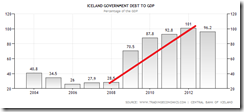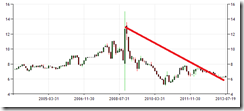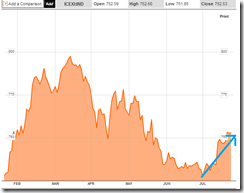Global equity markets appear to showing signs of exhaustion.
Possible Signs of Distribution?
This week’s pronounced weakness (top window) in major equity benchmarks has essentially pared down year-to-date gains (lower window).
Even US markets, which has been under the US Federal Reserve’s $85 billion a month steroids since September 2012[1], appear to be exhibiting signs of divergence.
While the Dow Jones Industrial Averages (INDU) posted only a marginal decline (-.09%) this week, there seems to be a broadening of losses seen across many important indices.
The S&P 500 fell 1.01%, the small cap Russell 2000 ($RUT) plunged 2.97%, the Dow Transports ($TRAN) plummeted 3.5% while 10 year US treasuries rallied, as yields fell. Yields of the 10 year US government bonds broke down from its recent uptrend.
The weakness in global equity markets have likewise been reflected on the commodity markets (upper window[2]). Stock market benchmarks of major commodity producers such as Brazil (EWZ) Canada (EWC) and Russia (RSX) have wobbled along with struggling commodity prices (top window[3]).
Such narrowing of gains and the broadening of losses can be seen as signs of distribution. They may indicate interim weakness.
So far, most of the ASEAN majors have remained resilient.
Except for Thailand, declines in the Philippine Phisix (-1.76%) and Indonesia’s JCE (-.3%) has been modest relative to their emerging market peers. Year-to-date, returns on the Phisix and the JCE remains at double digits, particularly 15.73% and 14.12% respectively.
Thailand’s SET has been hounded by sharp volatility following the assault on stock market investors by Thai authorities through the tightening of collateral requirements on credit margins. Even with this week’s 4.58% loss in Thailand’s SET, the Thai benchmark remains up 7% year to date.
Meanwhile the region’s laggard, the Malaysian KLSE has almost erased her annual losses with this week’s 1% weekly advance. The Prime Minister of Malaysia dissolved the parliament last April 3[4], which means that a general election will be held soon or no later than June 27 2013[5]. While politics may temporarily influence Malaysia’s markets, it will be the bubble cycle which will remain as the key driver.
The jury is out whether the diffusion of losses in global equity-commodity markets will persist and if these will begin to impact on ASEAN majors and or if developments in Thailand will also have an influence on the region’s performance.
Thailand’s equity markets will have to undergo the process of resolving the psychological conflict inflicted by Thai’s authorities.
As I wrote a few weeks back[6],
Market participants will then assess if SET officials will continue to foist uncertainty through more ‘tightening’ interventions, or if the authorities will allow markets to function. If the former, then Thai’s equity markets would have more downside bias going forward. If the latter, then Thai’s mania may catch a second wind.
If Thailand’s authorities will continue to intervene and prevent the mania phase from taking hold in the stock markets, then sentiment will only shift to the more fragmented, more loosely controlled and localized property markets
Capital Flight Will Help Inflate Asset Bubbles
The recent weakness in US equities may have been a function of 1st quarter diminishment of US money supply aggregate M2[7] (red ellipse left window). Actions of the US equity markets have been tightly linked to, or rather, caused by the Fed’s monetary expansion[8]. The recent reacceleration of M2 may suggest that any weakness may be temporary.
In addition, the inaugural action of newly installed chief of the Bank of Japan (BoJ) Haruhiko Kuroda has been to advance Prime Minister Shinzo Abe’s aggressive “Abenomics” policies. Mr. Kuroda’s mimics his European counterpart, Mario Draghi, to “do whatever it takes” to allegedly stop deflation for Japan.
Mr. Kuroda’s “shock and awe” opening salvo will be channeled through a grand experiment of doubling of the monetary base in 2 years[9] by aggressive asset purchases by the Bank of Japan mostly through bonds[10]. Such aggressive policy is likely to stoke a massive yen carry trade, or a euphemism for capital flight.
The initial impact of a vastly lower yen has been an asset boom; surging stock markets (The Nikkei was up 3.51% for the week, 23.46% for the year), and soaring bonds.
Rising bonds or lower yields or interest rates will induce more borrowing for the Japanese government. This will in the near term, fuel more asset bubbles.
However rapid diminution of the yen (-3.51% w-o-w, 11.11% y-t-d) will also mean that aside from asset bubbles, resident Japanese will likely seek shelter through foreign currencies in order to preserve their savings, thus, such policies entails greater risks of capital flight.
So instead of promoting investments and economic competitiveness, currency devaluation will lead to distortions in economic calculation, increased uncertainty, lesser investments and a lower standard of living.
I have been anticipating this move from the BoJ. A year ago, I said that ASEAN and the Philippines will likely become beneficiaries of BoJ’s inflationism[11]
The foremost reason why many Japanese may invest in the Philippines under the cover of “the least problematic” technically represents euphemism for capital fleeing Japan because of devaluation policies—capital flight!
Capital flight will be masqueraded with technical terminologies of portfolio flows and Foreign Direct Investments (FDIs)
Now even the billionaire trader-investor George Soros shares my view. In a recent TV interview, the Bloomberg quotes Mr. Soros warning of a potential stampede out of the yen[12],
“What Japan is doing is actually quite dangerous because they’re doing it after 25 years of just simply accumulating deficits and not getting the economy going,” Soros said in an interview with CNBC in Hong Kong today. “If the yen starts to fall, which it has done, and people in Japan realize that it’s liable to continue and want to put their money abroad, then the fall may become like an avalanche.”
And it appears that incipient signs of ‘capital flight’ may have emerged.
The perspicacious analyst and fund manager Doug Noland writing at the Credit Bubble Bulletin may have spotted what seems as incipient adverse reactions from the yen’s devaluation[13].
And Japan’s move to follow the Fed down the path of 24/7 monetary inflation is a key facet of the “global government finance Bubble” more generally. Japanese institutions were said to be major buyers of European bonds this week. French 10-year yields dropped 24 bps Thursday and Friday to a record low 1.75%. French yields were down about 50 bps in five weeks. Spain’s 10-year yields were down 32 bps points this week to 4.73%, and Italian yields sank 39 bps to 4.37%. Ten-year Treasury yields were down 12 bps in two sessions to end the week 14 bps lower at 1.71%. No Bubble?
One has to realize that every crises dynamics begins from the periphery to the core. If the Japan’s capital flight dynamics will intensify overtime, then a debt or currency crisis will befall on Japan, sooner rather than later. Such a crisis will slam the region hard.
And if the account where Japanese institutions have been major buyers of Euro bonds have indeed been accurate, then this would seem like the proverbial jump from the frying pan into the fire…a sign of desperation.
Seeking refuge via euro debts represents a dicey proposition.
I recently showed how the Spanish government has essentially employed Ponzi finance to survive their welfare state[14]. Aside from raiding of pension accounts, which signifies as a key source of the people’s savings, profits from trading arbitrages by the Spain’s government have become a key source of funding welfare obligations. Thus, central bank policies are likely to concentrate on propping up asset prices in order to sustain these political objectives or risks bankrupting the welfare state.
And any sign of trouble that would undermine asset markets will prompt for central banks to intervene.
The extended economic stagnation or recessions in the Eurozone as evidenced by record high unemployment[15] has prompted the markets to speculate that ECB’s Mario Draghi may consider further lowering of interest rates[16].
The growing desperation by governments to seize private sector savings directly—via unsecured deposits in Cyprus[17]—or indirectly—via Kuroda’s ‘Abenomics’ or aggressive inflationism extrapolates that faith on the current fiat based money and banking system will erode overtime.
Financial repression will only hasten the structural economic entropy borne out of the incumbent political system.
The Japanese government has been using the same Keynesian snake oil over and over again and yet has been expecting different results.
They aggressively cut interest rates between 1991-1995 and pursued zero bound rates ever since. They implemented 10 fiscal stimulus packages costing more than 100 trillion yen in taxpayer money, none of which have lifted Japan’s economy from the rut. Japan’s government switched to quantitative easing in 2001.
In August 2008, Japan’s government made another 11.5 trillion in stimulus, which consisted nearly of 1.8 trillion of spending and 10 trillion of loans and credit guarantees. In 2009 the BoJ embarked on new asset purchase program covering corporate bonds, commercial paper, exchange-traded funds (ETFs), and real estate investment trusts (REITs). From December 2008 through August 2011, the BoJ’s 134.8 trillion yen purchases of government and corporate securities failed to impact “inflation expectations” according to an IMF paper authored by Raphael Lam.
And thus, according to former Mises Institute President and now Senior Editor of Laissez Faire Books[18],
For more than two decades, the Japanese central bank and government have emptied the Keynesian tool chest looking for anything that would slay the deflation dragon. Reading the hysterics of the financial press and Japanese central bankers, one would think prices are plunging. Or that borrowers cannot repay loans and the economy is not just at a standstill, but in a tailspin. Tokyo must be one big soup line.
So what the mainstream reads as a coming miracle will lead to the opposite.
Yet the pressing problem for the marketplace today is that all these cumulative disruptive actions will translate to distressing intensification of market volatilities that will be manifested through capital flight and through yield chasing dynamics.
While price inflation has substantially been offset by productive activities of globalization and innovation, boom bust cycles will reduce productivity, increase systemic fragility to crises and promote social upheaval through revolutions or wars. In addition loss of productivity means greater sensitivity to price inflation.
Exploding prices of the “virtual or digital currency”, the bitcoin looks like a testament to the growing capital flight-yield chasing phenomenon at work[19].
Yet more predatory financial repression policies will mean more capital flight and yield chasing.
Unless external shocks—possibly such as the potential deterioration of geopolitical US-North Korea standoff into a full-scale military engagement—any slowdown for the Phisix will likely be limited and shallow, as the manic phase or the credit fuelled yield chasing process induced by domestic policies (artificially low interest rates and policy rates on special deposit accounts[20]) will likely be compounded by capital flight from developed nations as Japan.


















